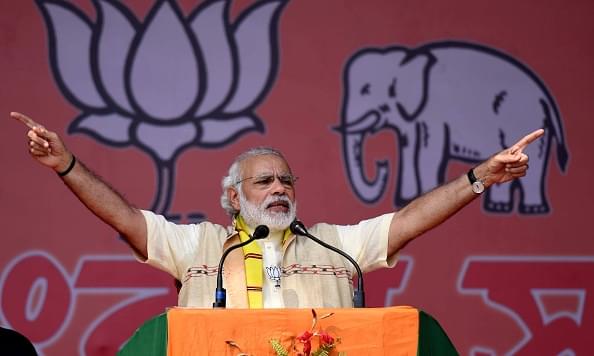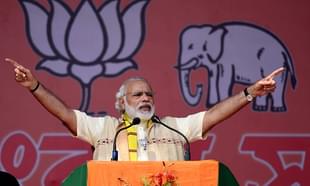Politics
Demonetisation: Why Modi Holds The High Cards In Fight With Opposition
R Jagannathan
Nov 16, 2016, 01:39 PM | Updated 01:37 PM IST
Save & read from anywhere!
Bookmark stories for easy access on any device or the Swarajya app.


Prime Minister Narendra Modi is said to be on the back foot as public anger grows over the demonetisation of Rs 500 and Rs 1,000 notes, forcing ordinary folks to stand in long queues outside bank branches and ATMs. However, while the inconvenience and angst are palpable, it is unlikely that his political opponents will be able to push their agitation beyond a point where Modi loses political traction.
Reason: Modi holds the high cards in this game, where politicians could be the biggest losers in the fight against bad money. The snaking queues outside banks will vanish by early December or at least the end of that month, but the scars left behind by demonetisation and the dent on black wealth will not go away anytime soon. Not least because Modi has more ammo with him.
A few days ago, Modi, while recognising the inconvenience caused to the public, held out a veiled threat to his opponents when he promised them that there could be more mayhem to come. In pre-election speeches in Goa and Karnataka, he said that demonetisation was not the last bow in his quiver. “I have more projects in mind to make India corruption-free. …We will take action against ‘benami’ property. This is major step to eradicate corruption and black money…”, The Indian Express quoted him as saying.
Given the depth to which real estate corruption has sunk – most national- and state-level politicians own benami properties – one can legitimately ask whether Modi is willing to take on the entire corrupt establishment in an all-or-nothing fight or is merely firing a warning shot across the bow.
But the ammo is for real. A story in Business Standard by Sai Manish suggests that Modi has been methodically building his arsenal to go after benami properties. He writes: “Modi’s plan to smoke out the real owners of benami properties rests on a three-pronged strategy – using information from digitised property records and verifying them, monitoring property transfers since sounding out his warning to benami property holders on 13 November, and a special monitoring of government officers with holdings much beyond their means.”
With the passing of the Benami Transactions (Prohibition) Amendment Act, 2016, Modi now has the statutory powers to go after property crooks, most of whom are either politicians or realtors connected to politicians. The law is draconian, and, as Manish explains, it can be used to confiscate benami properties. Demonetised money can be laundered sometimes, but confiscated property is gone forever.
Under the law, writes Manish, “Once the government sets the process in motion, an initiating officer will serve a notice on the benamidaar and take the property under his control. An adjudicating officer will then examine all documents and evidence and pass an order on whether to confiscate the property. Once the property is confiscated, it will be managed by an administrator till a further course of action is prescribed against the offender. What will further strike fear in the minds of beneficial owners and benamidaars is the provision of a jail term and massive fine if found guilty. The amended Act provides for prison terms of up to seven years and fines of up to 25 per cent of the fair market value of the confiscated property.”
If the law is used to go after many high-profile benamidaars, the property market will crash. That will bring its own deflationary trends and possibly lead to a systemic crisis, for the real estate industry has deep linkages with the real economy, the asset markets and the financial system.
It is thus not a threat that Modi can afford to invoke lightly. Unlike demonetisation, which will cause limited damage in the short run, a property crash will affect growth, banks and jobs in the medium term.
Given this reality, it is more than likely that Modi was only warning his political opponents to back off from taking their demonetisation actions beyond the point where it starts disrupting the economy dramatically. Strikes by transporters, small traders and businesses can destabilise the economy, and this cannot be something even Modi wants right now when short-term economic activity has already been impacted adversely.
But there is little doubt Modi holds some high cards in this eyeball-to-eyeball with his political rivals. The chances are more than 50:50 that his opponents will blink first. For demonetisation cannot be undone, and if it is going to stand (even the apex court has declined to intervene), the only real point is to steadily reduce inconveniences to the public. Modi is already on to this.
Moreover, Modi is taking the propaganda battle to the people. And here he has an advantage. Few people believe that he is corrupt, which is not something that can be said about his opposition.
Jagannathan is former Editorial Director, Swarajya. He tweets at @TheJaggi.





